Dispatch Review — A Sharp, Character-Driven Superhero Workplace Adventure
Superhero games usually focus on punching villains, saving cities, and delivering dramatic one-liners from behind the mask. Dispatch, however, asks a different question: what if the real pressure sits in the coordination center — a place where sharp humor, personality clashes, and crisis calls collide all at once?
Developed by AdHoc Studio, a team shaped by former Telltale creators, this adventure blends narrative choice-making with a workplace comedy tone that feels surprisingly grounded. Released episodically across PS5 and PC, the Dispatch game leans into character-driven storytelling, strong performances, and a structure that mirrors a studio TV series more than a traditional narrative title. With eight episodes rolled out between October 22 and November 12, the cadence gives the project a rhythm that fits modern streaming habits — almost like something you’d find in the “New on Netflix” row.
As narrative adventures see renewed interest, the story stands as a confident return to the genre — more intimate, more comedic, and ultimately more human than most superhero fare.
The Premise: A Superhero Story Told From the Control Room
TWhat makes the premise work is not just the point of view, but how the game uses it. Your job isn’t to fight villains — it’s to manage the unpredictable personalities who do. Missions stack up, tempers flare, and every decision nudges relationships in a different direction.
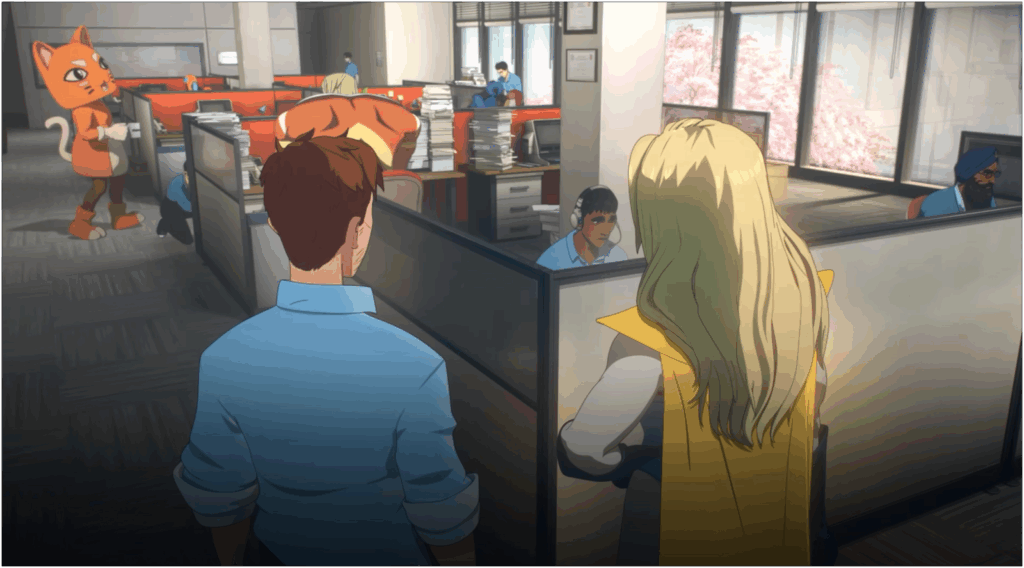
Instead of spotlighting heroics, the game leans into the moving parts behind them: competing priorities, mismatched egos, and the chaos of coordinating people who can level a city block but struggle to work together. That shift gives Dispatch game a grounded, character-first feel rather than a typical power fantasy.
The tone matches that approach. Choices matter, mistakes echo into later episodes, and the humor — often sharp or downright chaotic — comes from characters who speak with refreshing honesty. It’s a blend that channels some Telltale DNA but carries its own LA-flavored personality.
Gameplay & Structure: Choices, Consequences, and Quick Calls
The game follows a clear loop: crises come in, you decide who responds, and the story shifts based on those choices. Quick decision moments keep the pace tight, while the weekly, TV-style episode format gives the whole experience a steady, serial rhythm. Together, it creates a structure where every section adds its own layer of pressure and character growth.
Mission Assignments & Branching Decisions
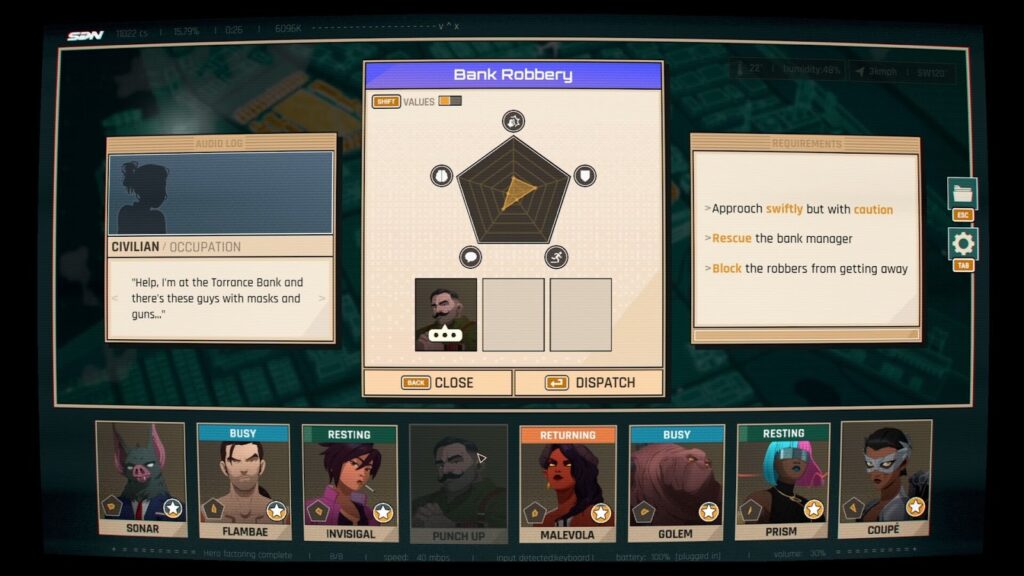
Most of the Dispatch video game plays out through choice-driven storytelling. You review incoming emergencies — fires, supervillain sightings, strange anomalies — and assign the hero (or combination of heroes) best suited for the job.
But it’s not just about power matchups. Personalities matter. Sending two heroes who can’t stand each other to handle a high-stress mission?
Expect fallout in the next episode.
AdHoc’s writers work these dynamics into branching paths, building relationships that shift depending on your management style. Support one hero too much and another might feel sidelined. Spread assignments evenly and some emergencies may escalate due to mismatched abilities.
QTEs and Light Management
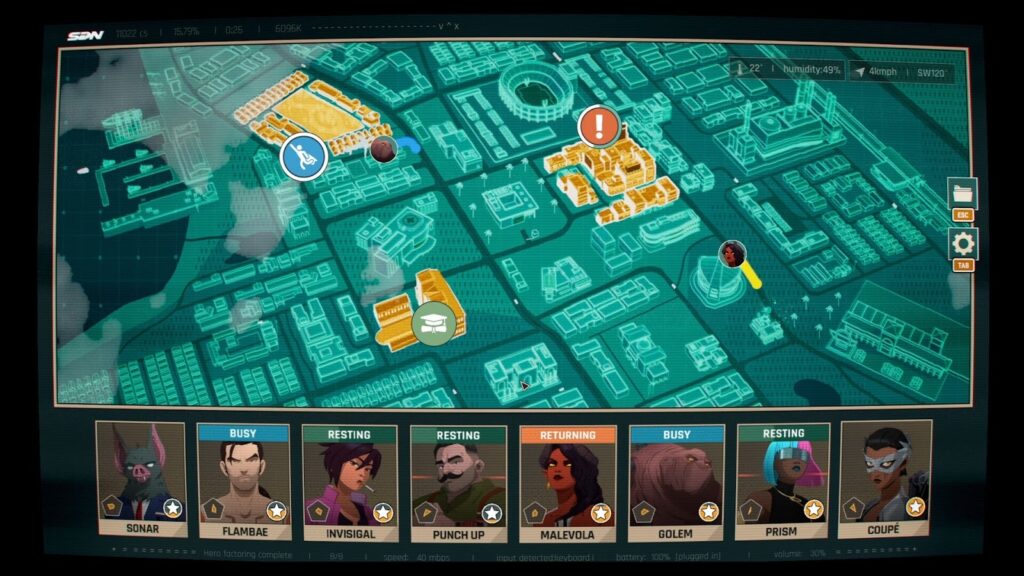
Quick-time events pop up when situations get messy — a building starts to give way, a hero drops out of contact, or a civilian throws an unexpected problem into the mix. These moments are brief and straightforward, just enough to keep the pace moving without turning the story into an action game.
On Steam Deck and PS5, the inputs register cleanly, so those sections don’t feel like a hassle. It ends up being a comfortable fit for portable play, which isn’t always the case for narrative-focused titles.
Episode Format & Release Model
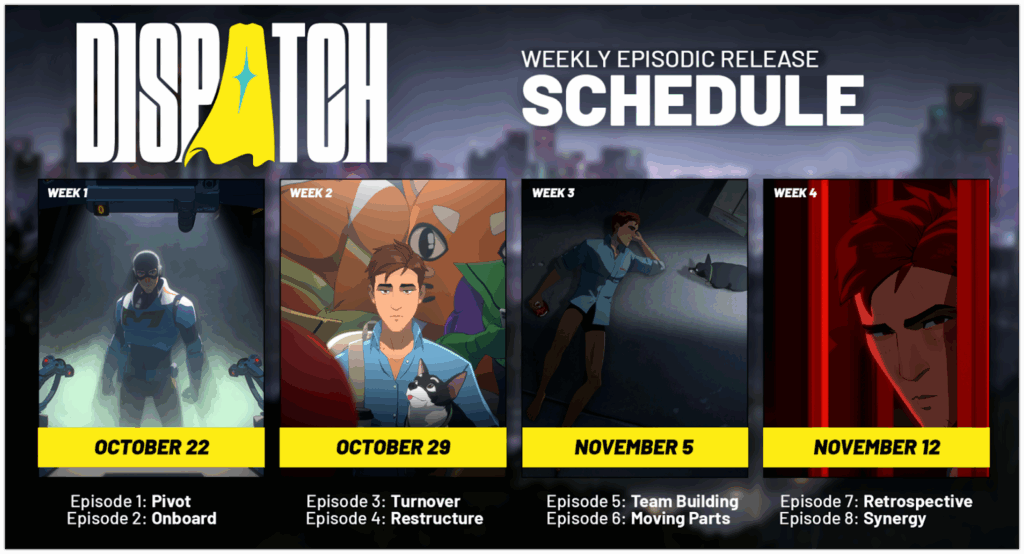
The Dispatch game release date rollout mirrors prestige streaming TV:
- Episodes 1–2: October 22
- Episodes 3–4: October 29
- Episodes 5–6: November 5
- Episodes 7–8: November 12
Each chapter runs 40–75 minutes. It’s a comfortable length — long enough to flex character arcs, short enough to binge over a weekend. The pacing benefits from this paired-release structure, giving each week a natural rise and fall as storylines mature.
Performances & Cast: Why This Ensemble Works
The cast is one of the game’s brightest highlights. Bringing in Aaron Paul (whose sharp, tense delivery evokes echoes of Breaking Bad), Laura Bailey, and Jeffrey Wright adds real dramatic weight to a world that could’ve easily slipped into parody.

- Aaron Paul voices one of the game’s more unpredictable heroes — charismatic, intense, occasionally unhinged.
- Laura Bailey gives a layered performance that balances humor with emotional nuance.
- Jeffrey Wright anchors the ensemble with gravitas, his voice a steady counterweight to the game’s more chaotic personalities.
Across the board, the Dispatch game cast elevates the script, turning what might have been simple archetypes into fully formed characters with history, insecurities, and agendas.
AdHoc’s pedigree shows — the team knows how to get intimate performances out of stylized characters. Their cinematic framing and thoughtful direction lend the narrative the confidence of a premium animated series.
Visual Identity & Presentation
Visually, the game lands between a comic-book aesthetic and modern animation. The environments — from the mission coordination hub to the nighttime Los Angeles skyline — balance grounded detail with bold stylistic touches.
The UI stays out of your way: choice wheels and mission cards are clean, readable, and color-coded, making priorities easy to read at a glance. Everything feels intentional rather than busy, which suits a game built around quick decisions.
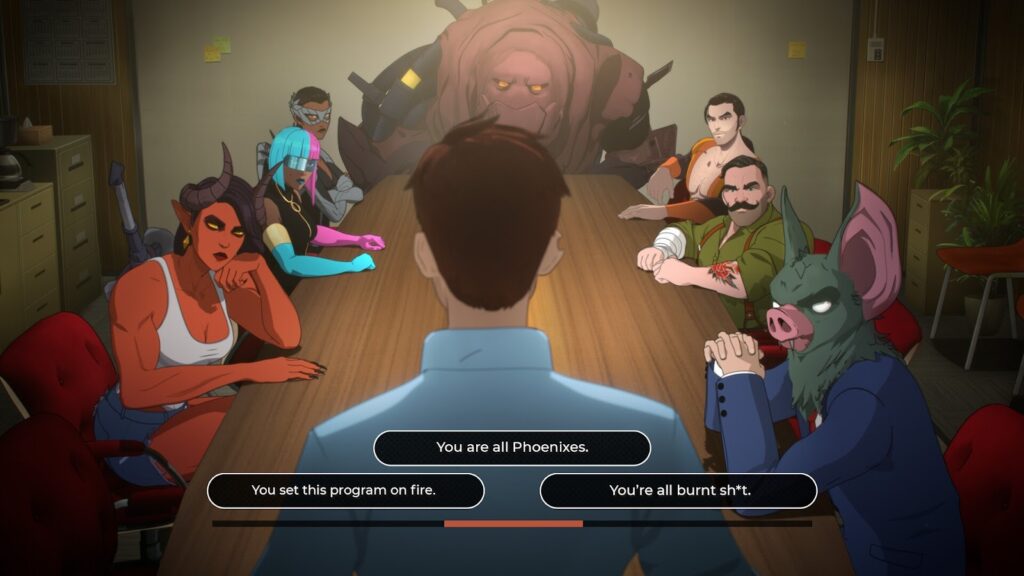
And while the visuals add plenty of personality, the humor pushes it even further. It’s sharp, unfiltered, and often delivered by villains who have absolutely no interest in softening the blow. Characters throw out brutal one-liners, swear without hesitation, and walk straight into chaotic or awkward moments like it’s second nature. It’s messy in the best way — the kind of rough-edged, character-driven humor that fits a team capable of saving the city yet still finding time to roast each other mid-crisis.
Release Date, Platforms & Market Reception
The Dispatch game officially launched in episodic form starting October 22, 2025, and concluded its rollout on November 12, 2025, across:
- PlayStation 5
- PC / Steam
- (Fully verified on Steam Deck, though not marketed as such)
Its debut made immediate waves. Within just ten days, the title sold over 1 million copies, signaling not only strong demand for the game, but also renewed appetite for choice-driven adventures — a genre that has felt quieter since the mid-2010s.
Community response has been particularly vibrant. Reddit hosts detailed discussions comparing branching paths, character allegiances, and episode rankings. Steam reviews often highlight the humor, cast chemistry, and surprisingly heartfelt arcs. Players are already posting flowcharts guessing at hidden decisions and alternate endings.
It’s rare for a narrative game to spark this kind of communal unraveling — a sign that Dispatch succeeds in giving players plenty to dissect.
Final Verdict: Should You Play It?
Dispatch is proof that superhero fiction doesn’t have to hinge on explosions or cosmic stakes. Its strengths lie in the smaller, more human details — the team dynamics, the tough calls, the awkward breakroom conversations after a mission goes sideways. If you come for spectacle, you’ll find it in stylized bursts. But if you stay, it’ll be for the characters.

Where it shines:
- Excellent performances from a star-heavy cast
- Smart mix of humor, tension, and workplace drama
- Branching choices with meaningful consequences
- Stylish presentation and smooth pacing
- Weekly episodic rollout that keeps momentum alive
Where it stumbles:
- Some episode transitions feel abrupt
- A few missions resolve off-screen, reducing impact
- Players wanting deep mechanics may find the systems light
Who will love it:
- Fans of Telltale and narrative adventures
- Players who enjoy character-driven stories
- Superhero fans looking for a fresh angle
- Steam Deck users searching for a portable-friendly narrative game
In a crowded superhero landscape, this story feels distinct — a tale about the people behind the capes, told with warmth, humor, and just enough chaos to keep you guessing.